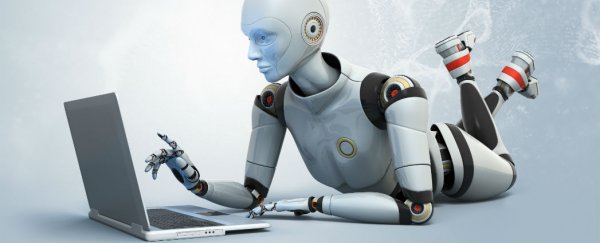Since 1871, the rise of technology has created more job opportunities than it's replaced, a new study has found, stating that while dangerous and repetitive jobs have been handed over to machines, positions in the care, education, creative, and service industries have increased.
"The dominant trend is of contracting employment in agriculture and manufacturing being more than offset by rapid growth in the caring, creative, technology, and business services sectors," economists at US consultancy Deloitte write, having analysed census data for England and Wales between 1871 and 2011. "Machines will take on more repetitive and laborious tasks, but seem no closer to eliminating the need for human labour than at any time in the last 150 years."
As artificial intelligence becomes more sophisticated with every humour-detecting, philosophy-spouting card shark of a robot that gets wheeled out of a university robotics lab, there's always the worry that one day a machine will do all of our jobs better than we ever can. Right now, driverless cars have truck drivers seriously worried, automated check-out systems are replacing human cashiers - whether you like it or not - and the Associated Press even has 'robot journalists' penning their own stories now.
But worry not, fellow humans, because the Deloitte economists' review of technology's place the job market - in the UK at least - has concluded that it's a "great job-creating machine", increasing our collective spending power and creating opportunities in the burgeoning 'leisure' sector.
"Rising wages and more leisure time has meant that people are spending more money on grooming now than they were during the Victorian period - as a result, there is now one hairdresser for every 287 people in England and Wales, as opposed to one for every 1,793 in 1871," Doug Bolton writes at The Independent.
The same thing can be seen in another great time sap: bars. "Despite the decline in the traditional pub, census data shows that the number of people employed in bars rose fourfold between 1951 and 2011," the report states.
Adding to this is the fact that more advanced technology has led to some serious price-cuts not only in essential goods, such as food, but also in bigger investments, including cars, televisions, and kitchen appliances. Which means more money leftover to take more holidays (= more tourism jobs), own more pets (= more vets and pet-sitting jobs), and indulge in more restaurant meals and cocktails (= more restaurant and bar staff), for example.
Plus all that extra cash needs someone to look after it, the report finding a 20-fold rise in accountants over the past 140 years.
We're also living longer (perhaps in part because we've given the dangerous jobs to machines) which has seen positions in the care industry skyrocket. As Katie Allen reports for The Guardian, the report found a 909 percent rise in nursing auxiliaries and assistants over the last two decades alone. In the same period, Allen reports, there was also a 580 percent increase in teaching and educational support assistants.
On the other hand, where technology seems to have irrevocably replaced jobs is in the agricultural field and, yep, laundry.
"In the UK the first sector to feel this effect on any scale was agriculture," says the study, calculating that the percentage of the workforce of England and Wales engaged in agriculture has gone from 6.6 percent in 1871 to 0.2 percent today. Similarly, says The Guardian, back in 1901, 200,000 of England and Wales's 32.5 million people were employed in the clothes-washing business, and by 2011, just 35,000 in a population of 56.1 million are flying the launderers' flag.
"A collision of technologies, indoor plumbing, electricity, and the affordable automatic washing machine have all but put paid to large laundries and the drudgery of hand-washing," the economists conclude.
Head to The Guardian to see a full breakdown of the results of the study.
Of course, the results apply only to part of the UK, so it would be fascinating to see how things shaped up for the rest of the world. And, interestingly, Deloitte itself acknowledges that things could change in the coming decades. A separate report published late last year found that one-third of jobs in the UK at risk from automation, with 35 percent of existing UK jobs at high risk of replacement in next 20 years.
Whatever happens, humans are nothing if not resourceful. Maybe we'll all end up serving our robot masters in robot bars, robot petshops, and robot cruise ships? As long as they don't turn on us, we'll probably be just fine.
